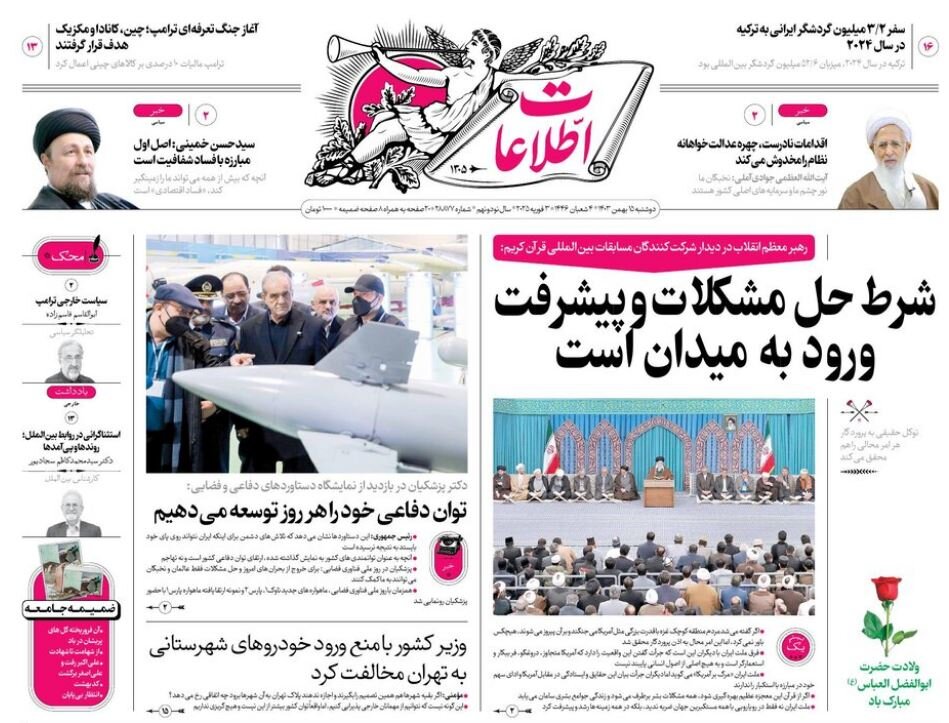Beneficiaries of sanctions aligned with enemies

TEHRAN - In an analysis, Ettelaat discussed the upcoming opportunities for negotiations and wrote: Dealing and negotiating in a fundamentally accepted principle in international relations.
Such approach is followed by the most powerful countries with the most powerful economies and the most competent managers and politicians. The hands of rent-seekers and idiots who try to show themselves smart but are enemies of national interests must be cut off. In the last five years, our statesmen have repeatedly had the opportunity to negotiate, make deals, and make necessary openings but the same beneficiaries of sanctions, with the promise of a harsh European winter, delayed and stopped the results of the exhausting negotiations. Europe managed its harsh winter, but the opportunity was lost for us. Along with these internal enemies, Iran’s competitors and enemies are also trying hard to prevent de-escalation and important negotiations with Iran. For example, the Zionist regime is vainly campaigning that Iran is in the weakest position to get Trump into a war that will be pointless for us and life-saving for Netanyahu and his partners.
Sobh-e-No: “Weak Iran” project on the agenda
In a note, Sobh-e-No addressed the statements of American officials against Iran. It wrote: In recent weeks, statements have been published by American officials that present Iran as a country in decline and emphasize the need to make key decisions against it. These statements have received widespread coverage, especially in the media. Characterizing Iran as a weak country is part of a broad cognitive war that the United States has used to weaken the spirit of resistance within the country and create pressure to change the behavior of the Islamic Republic. The image of Iran as a weak country is a complex cognitive operation that the United States uses to contain the Islamic Republic at the global level. The Islamic Republic of Iran has not only been able to resist these pressures, but by strengthening its relations it remains a regional power and an important player in West Asia. The “weak Iran” project, which failed in the past, will also fail in the future against the resistance and will of the Iranian people.
Kayhan: Let's not be fooled by Trump
In a commentary, Kayhan dealt with Trump's political thinking. The paper said: With today's domestic, regional, and global developments, the negotiating levers are not numerous and diverse. The 2025 Trump model is also more informed, more experienced, and much more self-interested than before, and these will be in favor of America in any negotiation, not the other side. The quality of Iran's relationship with Europe is also, if not the worst, in an unfavorable and tense state. Trump's claim that he is not a warmonger is also very naive and shows a lack of understanding of his thinking in the field of foreign policy. Trump intends to have complete hegemony over his surroundings and turn them into his backyard, and he has adopted a very decisive and even harsh stance in this direction. Trump will probably start by presenting a package of proposals with maximum demands, which will probably include the nuclear file, regional forces (resistance forces), and missile-military capabilities. Trump's conflict with Iran is not merely ideological. He is also engaged with everyone from Mexico, Canada, and Panama in his neighborhood to Europe, Russia, and China. And he does not honor mutual respect and a win-win agreement.
Farhikhtegan: Cut of funds to the opposition should not be taken as a positive signal
In an article, Farhikhtegan discussed the Trump administration’s move to freeze funds to the Iranian opposition groups based in Western countries. It said: It was just last week that Donald Trump announced his decision to stop multimillion-dollar funds to various countries, organizations, institutes, NGOs, etc. Immediately after announcing the new policy, some considered it a positive impulse from Trump to Iran. However, U.S. Secretary of State Marco Rubio bluntly said we cut off the funds because they were not doing their job well. This issue not only does not seem a positive impulse, but it could be an opportunity for the opposition to review their behavior and receive new rations. The main goal of America with this decision is to review and make its spending more targeted and not abandon its policies against Iran. The failure of sabotage projects, internal divisions among the opposition groups, and their failure in the 1401 unrest (the 2022 riots that followed the death of Mahsa Amini) have led American decision-makers to conclude that their investments have been futile. The main problem with these groups was the abuse of funds, and it was proven that they misused these funds for themselves, and only spent a small portion of them for the White House’s purposes.
